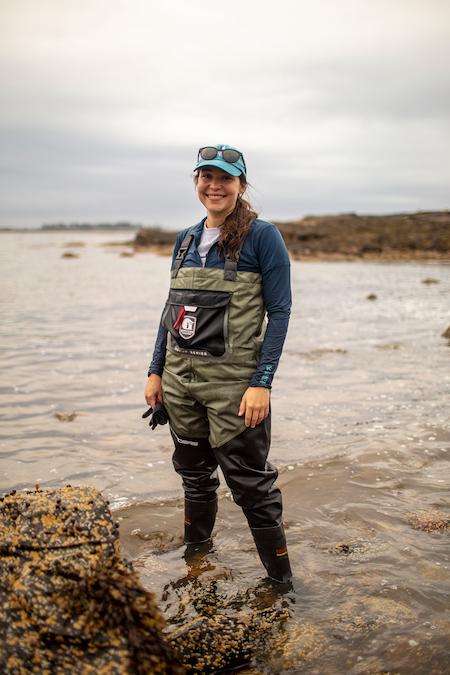
Melina Giakoumis' evidence of hybridization and adaptation in Asterias sea stars is published in Molecular Ecology.
Hybridization occurs when two species cross breed to successfully make offspring. Two species of North Atlantic sea stars, the North American Asterias forbesi and European Asterias rubens, known to cross breed in laboratory settings, were long suspected of hybridizing in their natural habitat.
Using genomic data and environmental niche modeling, City College of New York biology PhD Melina Giakoumis, associate director of the Institute for Comparative Genomics at the American Museum of Natural History, documented hybridization occurring along the coast from New England to the southern Canadian Maritimes. She then studied how environmental differences could have driven natural selection within and between species.
Sea stars such as A. rubens and A. forbesi are crucial to the health of intertidal ecosystems. As keystone species, their survival has a disproportionate impact on the fate of other species in their communities. “If their population crashes, other species follow,” said Giakoumis. However, the ecosystems where these sea stars once flourished are rapidly changing. “The Gulf of Maine is warming faster than 99 percent of the global ocean.” Sea stars the western North Atlantic ecosystem have been in serious decline since the 1970s.
Giakoumis found certain genomic variations in both species were driven by temperature. In the North American A. forbesi this genomic variation was statistically associated with long-term minimum temperatures. Conversely, long-term maximum temperatures were a factor for A. rubens, whose distribution extends along the North Atlantic intertidal zone well into the Arctic along the Norwegian coast.
For both species, nitrate concentration in their environment was highly associated with allelic variation, which may be important for a population’s potential for adaptability and survival.
“Will the hybrids’ movements follow the changes in sea surface temperatures so that eventually one species replaces the other?” said Giakoumis’ advisor, CCNY Biology Professor Michael Hickerson. Equally possible, hybridization could save the two species by generating a beneficial source of adaptive genetic variation.
Understanding these species’ adaptations to the environment will have implications for wildlife management and conservation in the North Atlantic intertidal region.
The study appears in the journal Molecular Ecology.
About the City College of New York
Since 1847, The City College of New York has provided a high-quality and affordable education to generations of New Yorkers in a wide variety of disciplines. CCNY embraces its position at the forefront of social change. It is ranked #1 by the Harvard-based Opportunity Insights out of 369 selective public colleges in the United States on the overall mobility index. This measure reflects both access and outcomes, representing the likelihood that a student at CCNY can move up two or more income quintiles. Education research organization Degree Choices ranks CCNY #1 nationally among universities for economic return on investment. In addition, the Center for World University Rankings places CCNY in the top 1.8% of universities worldwide in terms of academic excellence. Labor analytics firm Emsi puts at $1.9 billion CCNY’s annual economic impact on the regional economy (5 boroughs and 5 adjacent counties) and quantifies the “for dollar” return on investment to students, taxpayers and society. At City College, more than 15,000 students pursue undergraduate and graduate degrees in eight schools and divisions, driven by significant funded research, creativity and scholarship. This year, CCNY launched its most expansive fundraising campaign, ever. The campaign, titled “Doing Remarkable Things Together” seeks to bring the College’s Foundation to more than $1 billion in total assets in support of the College mission. CCNY is as diverse, dynamic and visionary as New York City itself. View CCNY Media Kit.